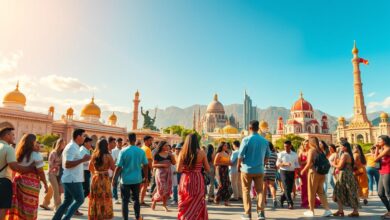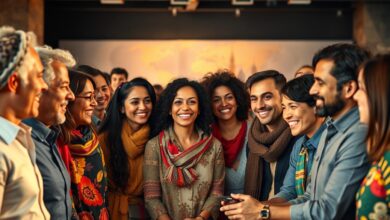Cultural Adaptation Tips for International Program Participants
For those in international programs, knowing how to adapt to new cultures is key. This guide offers tips to help you adjust to a new society. It’s based on studies like “Intercultural Communication: A Critical Introduction” and “The Culture Map: Breaking Through the Invisible Boundaries of Global Business.”
By understanding cultural differences, you can make meaningful connections. This enriches your time abroad. It’s all about recognizing cultural norms and practices to integrate well.
Understanding Cultural Differences
Grasping cultural differences is key for anyone wanting to connect with Nigerian society. Knowing about cultural norms helps improve how we interact with others. It allows us to build stronger relationships by valuing different cultures.
This understanding helps avoid misunderstandings and makes our interactions better. It’s important for both personal and work relationships.
Importance of Cultural Awareness
Cultural awareness makes our interactions smoother and our relationships deeper. In Nigeria, values like collectivism and respect for elders are very important. Knowing these helps us fit in better in different social settings.
Being open-minded and eager to learn from others is crucial. This approach shows respect and helps us communicate better.
Identifying Key Cultural Values
Knowing the key cultural values is essential for successful adaptation. In Nigeria, community, family, and communal living are key. These values shape how people interact with each other.
By recognizing these values, we can build trust. For example, joining community gatherings shows respect and acceptance. It’s a chance to strengthen community ties and build relationships.
Communication Styles in Nigeria
Understanding communication styles in Nigeria is key for anyone wanting to connect with the local culture. It’s not just about speaking the language. You also need to grasp the cultural background. In Nigeria, talking and body language are both important for getting along with people.
This knowledge is crucial for expats to fit in. It helps them navigate their new surroundings better.
Verbal Communication Nuances
In Nigeria, people often talk indirectly. This can be a shock for newcomers. They might use indirect words or say things in a way that avoids trouble.
They also use proverbs and idioms a lot. These sayings carry deep meanings that are important in conversations. For example:
- Culturally relevant proverbs illustrate wisdom.
- Metaphors enrich discussions, often requiring contextual awareness.
- Responses may be shaped by respect for hierarchy and seniority.
Non-verbal Communication Cues
Body language and facial expressions are big in Nigeria. They tell you more than words can. It’s important to understand these signals to connect better with people.
- Maintaining eye contact shows respect and interest.
- Hand gestures can indicate agreement or disagreement.
- Facial expressions often reflect emotions more than verbal indicators.
For expats, learning these cultural details is essential. Knowing how to communicate well is the key to making friends in Nigeria.
Navigating Social Norms and Etiquette
Understanding social norms and etiquette is key to blending in. Knowing how to greet, dine, and dress properly can make your cultural experience better. This section will guide you through the basics of Nigerian culture.
Greetings and Introductions
In Nigeria, greetings are very important and change based on who you’re talking to and where you are. A handshake is common, and asking about someone’s health is polite. Saying “Hello” is fine, but asking about family or local news shows you care.
When introducing yourself, using titles like ‘Mr.’, ‘Mrs.’, or ‘Dr.’ is a sign of respect. This follows the rules of cultural integration.
Dining Etiquette
Dining in Nigeria is a chance to learn about community and hospitality. Meals are shared, with everyone eating from the same dishes. Always wait for the host to start eating first.
It’s common to eat with your right hand, but using utensils can vary. Knowing these customs makes dining more enjoyable and shows respect for the culture.
Dress Code Expectations
The dress code in Nigeria depends on the occasion and the weather. Traditional clothes like ‘agbada’ for men and ‘gele’ for women are worn at formal events. In work settings, you should wear smart casual or business clothes.
Dressing modestly is important, especially in religious places. Being aware of these rules helps you fit in and respect local traditions.
Building Relationships in Nigerian Culture
Building strong relationships in Nigeria is key to successful integration. The Nigerian society is all about community ties. Family and friends are very important here. Knowing this helps you adapt to new cultures better.
Building rapport takes patience and consistent effort. It’s not easy, but it’s worth it.
The Role of Community
The community in Nigeria is very important. People help each other, creating a sense of safety and belonging. To fit in, join community activities and talk to your neighbors often.
By doing this, you learn about local customs and values. This helps you make real connections.
Building Trust and Rapport
Trust is the base of Nigerian relationships. It takes time to build trust, but it’s worth it. Here are some tips to help you:
- Be Consistent: Show you can be trusted by being reliable.
- Show Respect: Respect local customs and practices to show you care.
- Invest Time: Building rapport takes time, so be patient.
- Participate in Social Events: Going to local events helps you meet people and make connections.
By valuing community and working on trust, you can improve your cultural adaptation. Learning these skills is crucial for navigating Nigeria’s diverse culture.
Religion and Its Impact on Culture
Nigeria is a diverse nation with a rich tapestry of religious beliefs. These beliefs greatly influence its cultural landscape. Major religions include Christianity, Islam, and traditional African religions.
Each religion adds its own unique touch to the moral values, social norms, and daily practices of communities. For those looking to engage respectfully with local traditions, understanding these beliefs is key. It’s part of essential cultural sensitivity tips.
Overview of Major Religions in Nigeria
Christianity and Islam are the dominant religions in Nigeria, with deep historical roots and a large following. Traditional African religions also exist, often blending with Christianity and Islam. This blending offers a glimpse into local customs, rituals, and communal activities.
It highlights the importance of cultural acclimatization techniques when interacting within these environments.
Religious Observances and Customs
Religious observances shape Nigerian society. For Christians, Sundays are for worship. Islamic practices include Ramadan, with fasting and communal prayers.
Traditional rituals vary by region but often mark important life events like harvests, marriages, and milestones. Engaging with these customs respectfully fosters connections and deepens understanding across cultural divides.
Adapting to Work Environments
Working in Nigeria means understanding the workplace’s hierarchy and teamwork. Knowing the hierarchy is key, as respect for those above is crucial. This respect helps in getting along and moving up in your career. Learning about teamwork styles can help you work better with different people.
Understanding Workplace Hierarchy
In Nigerian workplaces, respect for elders and those in charge is big. This respect shows in many ways:
- Decisions usually come from the top, showing a top-down way of doing things.
- It’s important to call people by their titles and positions.
- Meetings often focus on what the seniors say, so newcomers should listen first.
These tips help newcomers fit in and keep the workplace peaceful. Being observant and respectful is key.
Collaboration Styles
Teamwork in Nigeria is about both individual and group efforts. Being flexible in teamwork is important:
- Having open talks builds trust and lets everyone share their ideas.
- Decisions made together are valued, bringing in different views and agreement.
- Being able to adjust is crucial, as people from different backgrounds work together.
Following these tips can make work better and more enjoyable. Being adaptable and understanding helps everyone do their best.
Education and Learning Styles
Nigeria’s education combines old and new teaching ways. It’s important to know these methods for learning in the country. This part talks about how these teaching styles help us adapt to new cultures and learn well.
Traditional Education Approaches
In Nigeria, education often focuses on memorizing facts. This method is rooted in cultural values that value remembering over thinking. Students take tests that show how well they remember. Traditional education is known for:
- Teacher-centered instruction
- Emphasis on exams and grades
- Uniform curriculum across regions
This type of learning might be different for those used to interactive classes. Knowing this helps us adjust to new cultures and learn better.
Adapting to New Teaching Methods
Nigeria is changing its education to include new ways of teaching. These new methods focus on thinking, creativity, and active learning. Teachers use different styles like:
- Group discussions
- Project-based learning
- Using technology in class
For people from other countries, learning these new teaching methods is key. It helps us understand Nigerian education better and adapt to different places.
Overcoming Culture Shock
Culture shock is common in international programs, especially in diverse places like Nigeria. Knowing the signs is key to adapting well. Understanding these signs helps participants navigate new cultural settings.
Signs of Culture Shock
Culture shock shows in many ways. It’s important for participants to recognize these signs. They may include:
- Feelings of confusion about customs and practices.
- Increased frustration when communication is hard.
- Homesickness for familiar places.
- Fatigue from adapting to new things all the time.
- Withdrawal from social activities.
Strategies for Adjustment
Using practical strategies can make the transition easier. Here are some tips for cultural adaptation:
- Develop coping mechanisms like journaling or mindfulness.
- Find local support, like friends and other participants, to share experiences.
- Slowly get involved in the local culture by going to cultural events or trying new foods.
- Learn basic phrases in the local language to help with communication.
- Keep an open mind and accept differences instead of fighting them.
Local Languages and Dialects
Language is key to connecting with different cultures. In Nigeria, knowing local dialects like Yoruba, Igbo, and Hausa is important. It shows respect for traditions and helps in communication.
Using local languages makes relationships stronger. It also deepens your understanding of Nigeria’s rich culture.
Importance of Language in Cultural Integration
Knowing local languages is crucial for cultural integration. It helps break barriers and lets people connect deeply. Learning basic phrases shows you’re open to the culture.
It also helps you appreciate cultural differences. This is key to building good relationships.
Basic Phrases to Learn
Learning essential phrases can improve communication. Here are some useful ones:
- Hello – Bawo ni (Yoruba) / Kedu (Igbo) / Sannu (Hausa)
- Thank you – O seun (Yoruba) / Daalụ (Igbo) / Nagode (Hausa)
- How are you? – Bawo ni (Yoruba) / Kedu ka ị mere (Igbo) / Lafiya lau (Hausa)
- Goodbye – O dabọ (Yoruba) / Ka chi fo (Igbo) / Sai an jima (Hausa)
Cuisine and Dietary Practices
Nigeria is known for its rich and diverse food culture. Understanding local cuisine is key for adapting to the culture. Food is a big part of daily life and social interactions. Knowing popular dishes can make your experience better and help you connect with the community.
Popular Nigerian Dishes
Some of the most loved dishes include:
- Jollof Rice: A flavorful one-pot dish made with tomatoes, onions, and spices, perfect for gatherings.
- Pounded Yam: A starchy side dish served with soups and stews, adding bulk to meals.
- Egusi Soup: Rich in flavor, made from ground melon seeds, often served with meats or fish.
These dishes show the variety of Nigerian cuisine. Exploring local markets can teach you about food preparation and cooking methods. It’s a great way to learn about the culture.
Dietary Restrictions and Considerations
Knowing about dietary restrictions helps in social interactions. Different factors can affect what people eat, like health or cultural practices. Some common restrictions include:
- Vegetarianism: While meat is common, vegetarian options are available, especially in cities.
- Islamic Dietary Laws: Muslims follow Halal practices, which means they only eat certain types of meat.
Being aware of these dietary rules helps expats connect with the culture. It makes dining out more enjoyable as you navigate Nigeria’s diverse culture.
Engaging in Local Traditions and Festivals
Nigeria’s culture comes alive with its many festivals. Each festival shows off unique traditions and community ties. Taking part in these events is a great way to dive into Nigerian culture.
From the Osun-Osogbo Festival honoring the river goddess to the Argungu Festival’s fishing competitions, joining in offers a peek into Nigeria’s rich culture.
Overview of Key Cultural Festivals
Important festivals in Nigeria help keep traditions alive and show off local talent. Some key ones are:
- Osun-Osogbo Festival: This festival honors the goddess Osun with colorful rituals, art, and community events.
- Argungu Festival: Known for its fishing contest, it’s a symbol of good fortune and draws visitors from everywhere.
- Durbar Festival: A grand parade with horse riders and traditional clothes, marking the end of Ramadan in northern Nigeria.
Participating in Local Celebrations
Getting involved in these festivals can make you more aware of cultural differences. Here’s how to do it right:
- Wear clothes that fit the festival’s theme and local customs.
- Understand the importance of rituals and ceremonies, showing respect for local beliefs.
- Talk to people, making friends and deepening your cultural experience.
By doing these things, you not only fit in but also celebrate Nigerian culture. Joining in local festivals shows you value and understand different cultures.
Resources for Continued Learning
For those diving into cultural immersion in Nigeria, the right resources can make a big difference. Books, articles, and online platforms offer deep insights into culture. They help international participants learn and adapt more smoothly.
Recommended Books and Articles
“Cultural Insights: A Guide for International Participants” is a great resource. It dives into Nigerian traditions and communication styles. It’s perfect for those wanting to understand cultural nuances better.
Scholarly articles also play a key role. They discuss multicultural interactions and help participants navigate their new surroundings.
Online Resources and Communities
The internet is full of tools for learning about culture. Sites like “Online Educational Resources for Culture Learning” have tutorials and articles on Nigerian customs. They’re great for those looking to learn more.
Expats in Nigeria also have online communities. These spaces are for sharing experiences and getting support. They offer a network of understanding and encouragement.
FAQ
What are some cultural adaptation tips for international program participants?
How can individuals navigate cultural differences effectively?
What strategies can help with cross-cultural adjustment?
What are some tips for successful cultural integration?
What signs indicate that someone might be experiencing culture shock?
How can individuals build relationships in a new cultural context?
What are the best practices for learning local languages and dialects?
How can one engage respectfully in local traditions and festivals?
Are there specific resources for ongoing cultural learning and adaptation?
Published on: 16 de April de 2025

Galena Garcia
Galena Garcia is the visionary behind Portal Santista. With a degree in Business Administration and a specialization in Marketing for the financial sector, Galena brings years of experience from the corporate world, where she developed a deep passion for helping both businesses and individuals thrive financially.
Driven by a desire to share her knowledge with a broader audience, she founded Portal Santista—an online space dedicated to providing useful, practical, and reliable information on finance, marketing, and business management.
Outside of her professional life, Galena is an animal lover, a devoted reader of romantic novels, and loves spending fun moments with her nieces and nephews. Her unique blend of technical expertise and genuine care for people is what makes Portal Santista such a special place.



